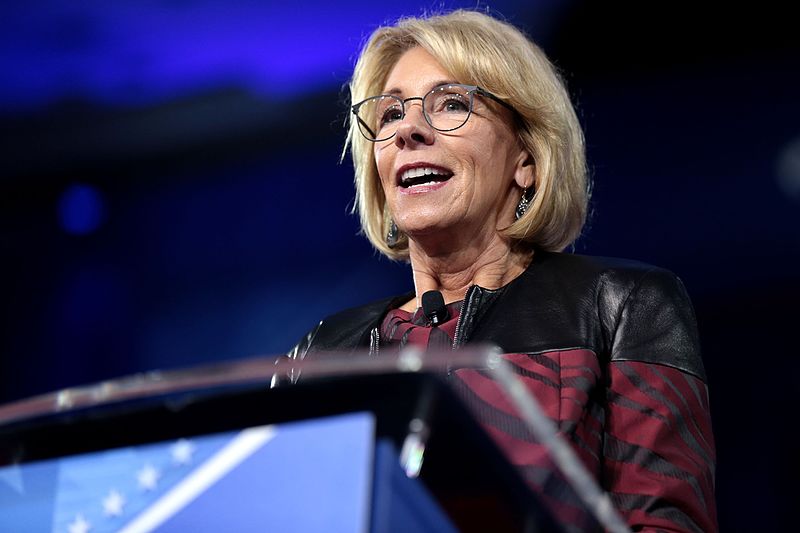When it comes to well-functioning market economy, choice is imperative. Education is no exception. It has become a divisive issue in politics today, especially since the appointment of Betsy DeVos as the Secretary of Education on Trump’s cabinet.
Many oppose DeVos, stating she is “not qualified”, “not in the best interests of the young people of America” and that it is “hard to imagine a worse choice [for Secretary of Education].” The fact of the matter is, DeVos has created and worked with foundations dedicated to school choice and voucher programs for low-income communities. She describes herself as “a firm believer that parents should be empowered to choose the learning environment that’s best for each of their individual children.” As shown in the video below, some of her critics fail to recognize her policies and qualifications, and in fact, agree with her proposed vouchers for education.
https://www.youtube.com/watch?time_continue=241&v=z-rL4ySsA-E
In short, the vouchers work by allotting each child a specific dollar amount to spend solely on education, whether it be public, private or charter. “Let the education dollars follow each child, instead of forcing the child to follow the dollars,” says DeVos. The premise of the vouchers is to allow parents to choose the school suited for their own child(ren)’s individual needs. Vouchers foster innovation, lead to more integration in schools and break down racial and socioeconomic barriers that have historically prevented many students from accessing the schools most appropriate for them.
In the free market, people choose how and where to spend their money, offering incentives for businesses to provide a desirable product. In the education system, vouchers work similarly, resulting in increased competition among schools to deliver high-quality instruction. Of 23 studies that examine how school choice affects academic outcomes in public school systems, 22 found that choice improves both the number and quality of outcomes. When competition flourishes, it gives rise to innovation by educators to discover the best teaching practices, in turn leading to increased student success.
Those who oppose school choice, DeVos’s voucher system in particular, claim it will drain public schools of funding. This is incorrect, as private schools charge tuition and public schools receive funding on a per-student basis. School choice saves money and increases per-student spending in public schools. Education funding belongs to students, not a particular school type or building.
Our current education system is far from perfect; even in our post-civil rights era, segregation continues to exist. “White flight,” the phenomenon of white families fleeing their neighborhoods or pulling their children out of public schools to avoid racially integrated schools, is especially prevalent in the South. With a system of vouchers in place, America will be one step closer to ending discrimination. Eight empirical studies have examined how school choice relates to racial segregation in schools; according to Greg Forster, a senior fellow with the Friedman Foundation for Educational Choice, “Of these, seven find that school choice moves students from more segregated schools into less segregated schools. One finds no net effect on segregation from school choice. No empirical study has found that [school] choice increases racial segregation.”
In 2012, a similar study on school choice was completed by Harvard University in New York. According to the authors, “Using a voucher to attend private school increased the overall college enrollment rate among African Americans by 24 percent.” Equal opportunity for all begins with early education.
DeVos states, “People deserve choices and options.” It is clear that school choice enhances freedom and opportunity for every child. It’s time we put families back in charge of their own education.









